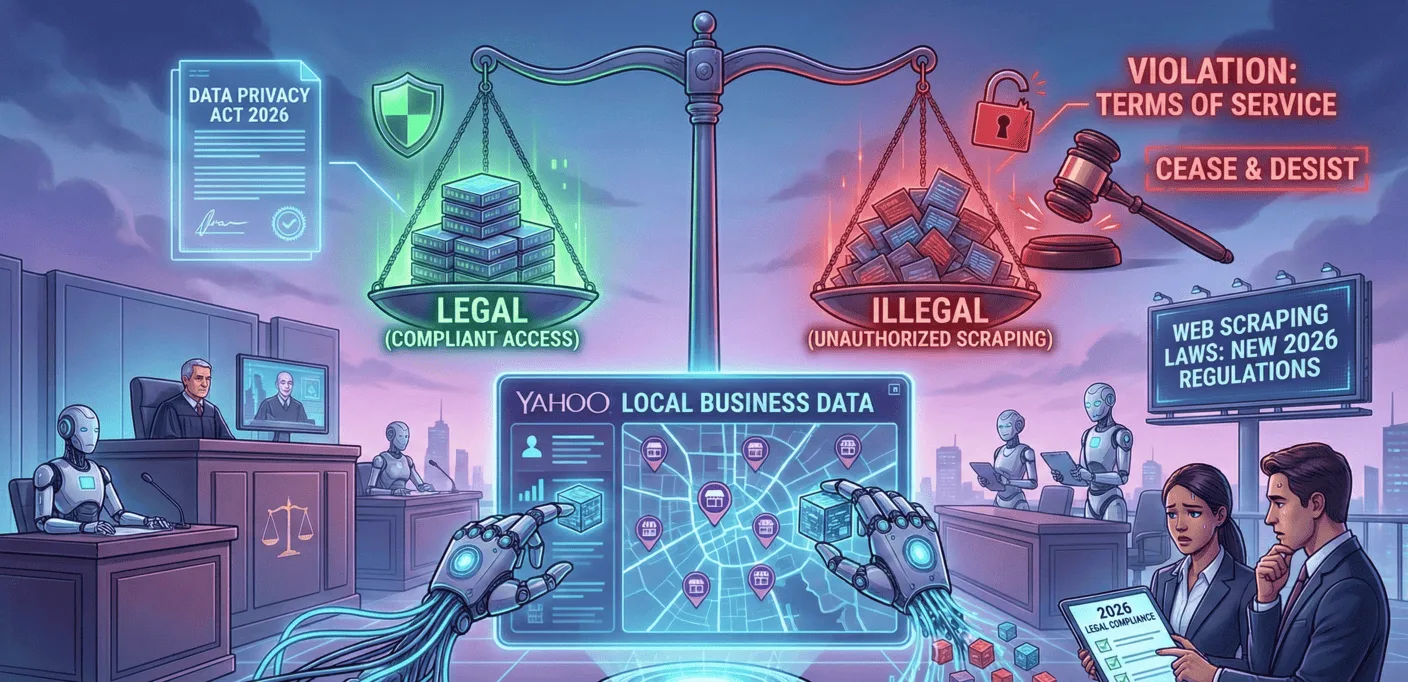Is Scraping Yahoo Local Legal? The Hidden Risks You Need to Know

Introduction
Business directories are catnip in local search optimization and online marketing. They pack in names, addresses, phone numbers, categories, reviews, the material with which outreach, citations and competition research can be constructed. One such treasure trove is Yahoo Local and it is a prickly question, can you legally scrape it?
On the surface, it seems to be safe to copy what is already public. Any person can access those listings, right? However, as soon as you introduce automated tools into the equation, you are on somewhat unsafe territory. Scraping Yahoo Local usually breaches the Terms of Service of the site and may fumble over the intellectual property rights. That’s not a small risk.
This paper unravels the reasons scraping is not legally safe, what may occur should you go ahead and scrape, and what you might possibly think about instead-as well as where such scrapers as Yahoo Local Scraper and Public Scraper Ultimate stand in this area.
Why Scrape Yahoo Local
Admittedly, the incentive is self-evident.
- Business listing (NAP): names, addresses, telephone numbers.
- Families: simple industry targeting.
- Reviews: sentimental and competitor monitoring.
- Citations: fuel for local SEO.
- Leads: large sortable sales team lists.
At scale, such data is strong. And that is precisely why it is so difficult to resist the temptation to automatize the harvest-and where the problem begins.
Therefore, Is It Legal to Scrape Yahoo Local?
Short answer: in general, no-certainly not a bet that is safe in law. Being publicly visible does not mean that it is allowed to scale to bots and extract. Here’s the crux:
Terms of Service Conflicts
Yahoo Local is a compromise with Yahoo. Such regulations do not allow automated mining, particularly in commercial purposes. Violate the contract, and you have put yourself in the way of an injunction.
Intellectual Property Issues
Yahoo Local has an intellectual property in its structure, presentation and database. The manner in which such data is structured and presented belongs to Yahoo even though the business listings might be public. Duplicating it is a violation of these rights on a large scale.
Illegal Commercial Usage
Claims can be caused by scraping to resell leads, republish listings or populating your own database. Companies do act regarding this.
Legal Risks and Penalties
Scraping Yahoo Local may have possible consequences that include:
- Yahoo/Verizon Media civil litigation.
- DMCA take down requests in case of republishing scraped materials.
- Yahoo systems IP blocking and bans.
The “Public Data” Trap
There is a myth according to which: when it is in the air it is free to take. Not quite. You can window shop in a library, though not roll the stacks and duplicate the catalog in order to market it as your own. Online directories operate the same manner-it is not a blanket permission to copy.
Cleverer Substitutes to Crude Scraping
In case direct scraping is dangerous, then all that remains is what? The realist action is to take advantage of data-collection instruments and procedures in manners that honor site regulations and valid legislation-and minimize the temptation to bang a single source.
Yahoo Local Scraper, Focused Scraper
Yahoo local scraper is more engaged in retrieving basic listing information which includes:
- Business name, address and phone numbers.
- Categories and types of business.
- Internet connections and contact details.
It has been designed in a manner that is accurate and fast, this is why it is liked by agencies and SEO teams. Major caveat (which is important): any usage of any scraper should not be against the terms of the source site or the law.
Public Scraper Ultimate – Wider Data Engine
Public Scraper Ultimate is bundled with a variety of modules (including Yahoo Local) and includes:
- Proxy support
- Multi-threading to ensure high speed.
- Specific filters to narrow down to what you want.
- Automatic update to fit the changes of the site.
It is technical abilities, not a permission slip. They do not subvert Terms of Service or legal boundaries.
Best Practices (Assuming That You Are Collecting Data)
When you are doing any data collection, make it tedious and cautious:
- Minimize: gather only what is necessary.
- Retain it in-house: do not republish third parties.
- Check the rules: read terms of service on a regular basis and observe them.
- Mind access controls: do not attempt to avoid blocks or protections-this is where the line between legal and ethical is soon crossed.
That’s the safer posture. It is not glitzy, but it will at least have you outside the blast radius.
Final Thoughts
And is it until now that scraping Yahoo Local is not legal? No-practically it would contravene the terms of the platform and expose itself to violation of some of the guarded contents of the directory. Public does not imply free-for-all and “everyone does it” is no defense.
Use professional tools that make sense and are not illegal should you be serious about local SEO and market research. It does not have to capture as much data as possible in the shortest time; it must create a process that is sustainable, accurate, and risk-free. Do it and you will be able to get loads of value without walking into a legal buzzsaw.
Leave a Reply